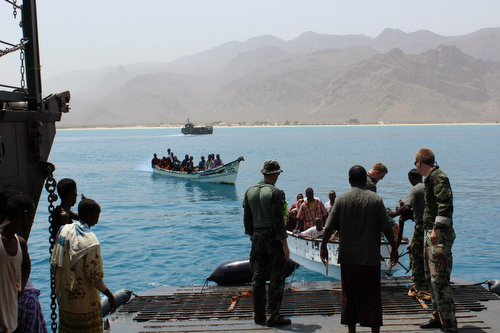100 Tage Piratenjagd
Die Niederländer haben derzeit das Kommando am Horn von Afrika in der NATO-Antipirateriemission Ocean Shield. Und obwohl zu dieser Task Force 508 derzeit nur zwei Schiffe gehören, die niederländische Rotterdam und die amerikanische Halyburton, drückt Commodore Ben Bekkering kräftig aufs Tempo: Wenn die Piraten in den vergangenen Monaten – unter anderem wegen des Monsuns – nicht so aktiv sind, müssen eben die Soldaten ein bisschen aktiver werden.
Das führte unter anderem dazu, dass Bekkering und seine Soldaten neue Dinge ausprobiert haben. Zum Beispiel regelmäßige Gespräche mit Clan- und Dorfältesten in Somalia. Oder die medizinische Versorgung von Somalis – an Bord eines niederländischen Landungsbootes direkt vor der Küste.
On Sept. 3, the NATO flagship HNLMS Rotterdam was able to deliver medical assistance off the northeast coast of Somalia, while conducting its counter piracy mission in Operation Ocean Shield. Shortly after sunrise, Rotterdam anchored a few miles off the coast near the village of Bandar Murcayo and deployed a medical team and improvised facilities via landing craft. As the craft approached the coastline, the villagers used small boats to reach the medical team aboard the landing craft, where they were able to receive basic medical examinations and assistance. (Photo: NATO/Ocean Shield)
Und die Niederländer reden auch gerne über das, was sie tun. Fast könnte man vergessen, dass die EU mit ihrer Anti-Pirateriemission Atalanta derzeit fast drei mal so viele Schiffe wie Ocean Shield und zusätzliche Seefernaufklärer am Horn von Afrika im Einsatz hat, so wenig hört man von EUNAVFOR, der European Naval Force.
Heute hat Commodore Bekkering eine vorläufige Bilanz nach 100 Tagen als Kommandeur gezogen:
On 6th June, Commodore Ben Bekkering took over as Commander of NATO’s counter piracy mission, Operation Ocean Shield. Today, with ships patrolling the shipping corridor in the Gulf of Aden and present in front of the Somali coast, the Task Force remains ready to prevent successful pirate attacks.
Since then two merchant ships have been attacked by pirates however neither were successful. This represents a significant decline compared to previous periods. More importantly, no merchant ships have been hijacked by pirates since May. This does not mean that the pirates don’t try. On two occasions over the Summer, they managed to hijack a dhow which could have been used as a mothership from which to launch attacks. On both occasions the pirates were disrupted by the NATO warships, HNLMS Evertsen and HNLMS Rotterdam but they still hold seven ships and 177 crewmembers hostage.
During September as the weather improves and fishermen go back out to sea, this is the time that the pirates resume their activities. By using calm seas and forcing dhows to move them to and around their hunting grounds, the pirates continue to seek opportunities to stalk and attack the many merchant ships that transit the vital shipping lanes around the Horn of Africa.
Lieutenant Commander Mac de Jong, staff officer on board the NATO flagship, HNLMS Rotterdam, is very happy with the declining success rates of the pirates. “We are not there yet, the success is still reversible. Therefore we need to seek ways to maximise the pressure. We are making considerable progress, we must now maintain the momentum.”
NATO’s Task Force has used the past monsoon period to gather information on areas where pirates may venture out at sea. Using surveillance by aircraft and ships along the coast where the seas allowed pirates to operate, NATO has built up a good picture of what has been happening along the coast of Somalia.
As NATO warships patrol off the coast of Somalia, it presents an excellent opportunity to invite local elders and community leaders to meet NATO at sea. Commodore Ben Bekkering explains: “By meeting village elders and explaining to the villagers what we do and why, we hope to build trust, exchange information and ensure that the improving maritime safety and security will also benefit them.”
From these meetings it is clear that the local populations strongly oppose piracy and will do all they can to work with the international counter piracy effort. Bekkering adds, “I am sure that in the villages we found new partners. They can play a vital role to put more pressure on the pirates. If we can drive the pirates out, it will have a positive effect on the development of the region.”
NATO is working alongside EUNAVFOR, Combined Maritime Forces and individual nations to tackle acts of piracy. By joining forces, counter piracy efforts are more effective and can achieve more than any one ship, navy, organisation or country working alone.




Gerade der letzte Satz gibt mir zu denken. Eine oberflächliche Suche (wiki: Piraterie vor der Küste Somalias) ergibt, dass neben Atalanta und Ocean Shield (=TF508) noch CTF 151, sowie etliche maritime Einheiten diverser Staaten in dem Seegebiet operieren.
So viele eingesetzte Schiffe – dass da überhaupt noch Bewegung möglich ist…
Nur: die einen schützen die Hilfslieferungen der UN, die anderen die kommerzielle Schiffahrt, andere gehen gegen „Ziele“ an Land vor – wer macht da eigentlich was?
Schön, wenn sich da ausgerechnet TF508 (u.a. „Aufbau eigener Fähigkeiten der Anrainerstaaten zur Bekämpfung der Piraterie“) ein humanitäres Mäntelchen umlegen kann!
Es stimmt, auf den ersten Blick sind viele Task Forces vor Ort, allerdings ist das zu überwachende Gebiet riesig und wer sagt denn das alle zusammen arbeiten?
Man ist ja schon froh Positionen der Inder, Chinesen, Russen und selbst Iraner zu bekommen.
Auch in „strategic communication“ gibt’s für so manche Task Force noch was zu lernen… Hoffe, EUNAVFOR plottet mit :)
Wir währen schon mit einem gemeinsamen LINK zufrieden……als Anfang (innerhalb der westlichen Marinen). Es entsteht aber immerr wieder der Eindruck das dies von „oben“ nicht erwünscht wird.